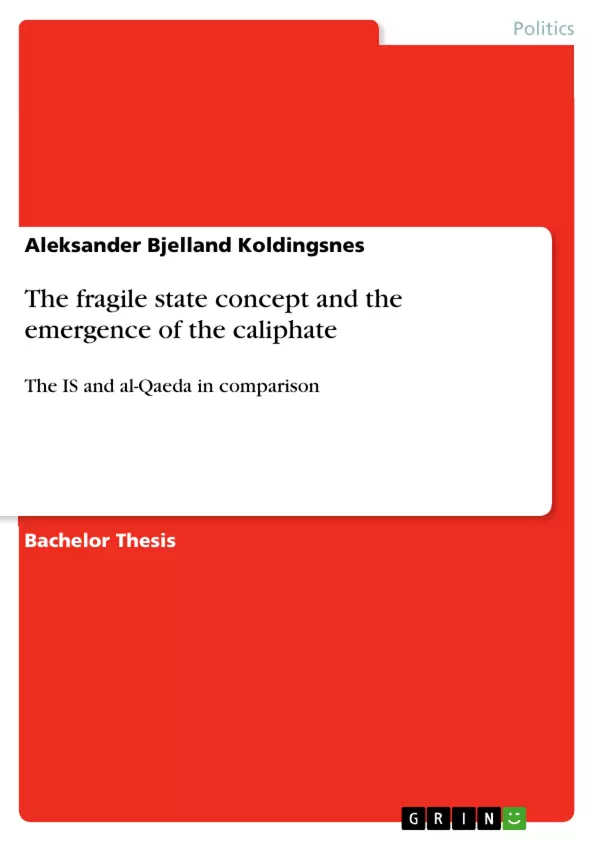
The fragile state concept and the emergence of the caliphate
Bachelorarbeit, 2015
21 Seiten, Note: C
Leseprobe
Inhaltsverzeichnis (Table of Contents)
- Introduction
- Historical background
- The Islamic State
- Al-Qaeda
- Iraq
- 2000-2001
- 2013-2014
- Concept and Theory of Fragile States
- Caliphate
- Method
- Discussion
- A fragile state?
- The loss of physical control of its territory or monopoly on the legitimate use of force
- The erosion of legitimate authority to make collective decisions and the inability to provide reasonable public services
- The inability to interact with other states as a full member of the international community
- Al-Qaeda
- Conclusion
Zielsetzung und Themenschwerpunkte (Objectives and Key Themes)
This essay aims to explore the connection between the fragile state concept and the emergence of the Islamic State's (IS) caliphate in 2014, specifically examining why IS, rather than al-Qaeda, was able to establish a caliphate. The essay uses the fragile state concept to analyze the situation in Iraq, comparing the circumstances surrounding al-Qaeda in 2000-2001 with those of IS in 2013-2014.
- The fragile state concept
- The establishment of the Islamic State (IS) caliphate in 2014
- The differences between IS and al-Qaeda
- The role of the Iraqi state in the emergence of IS
- The influence of the Syrian civil war on IS's rise
Zusammenfassung der Kapitel (Chapter Summaries)
The essay begins with an introduction, outlining the research question and providing context for the study. The next chapter examines the historical background of IS, al-Qaeda, and Iraq, focusing on the key events and figures that shaped the groups and the region. This chapter traces the evolution of IS from its founding in 2006 to its declaration of a caliphate in 2014, highlighting the role of influential leaders and the group's shifting strategies.
The third chapter explores the concept and theory of fragile states, defining the concept and outlining the characteristics of a fragile state. The chapter discusses the potential connection between a fragile state and the emergence of terrorist groups like IS and al-Qaeda, providing a framework for analyzing the situation in Iraq.
The chapter on the method outlines the specific approach taken in the essay, explaining the chosen time periods for comparison, the chosen variables for analysis, and the key sources of information. The discussion chapter focuses on the specific variables of the fragile state concept and their relevance to the emergence of IS. The chapter examines how IS's rise aligns with the characteristics of a fragile state, drawing comparisons with al-Qaeda's experience.
Schlüsselwörter (Keywords)
The primary keywords of this essay include the fragile state concept, Islamic State (IS), al-Qaeda, caliphate, Iraq, Syria, jihadist-Salafism, and terrorism. The essay focuses on the relationship between state fragility and the emergence of terrorist groups, specifically exploring how the characteristics of a fragile state contributed to the rise of IS and its declaration of a caliphate in 2014.
Frequently Asked Questions
What is the "fragile state" concept?
A fragile state is characterized by a loss of physical control over its territory, erosion of legitimate authority, and the inability to provide basic public services.
Why was the Islamic State (IS) able to establish a caliphate in 2014?
The study suggests that IS exploited the extreme fragility of the Iraqi state and the power vacuum caused by the Syrian civil war to claim territorial control.
How did IS differ from al-Qaeda regarding the caliphate?
While both had the caliphate as a goal, al-Qaeda focused more on advising affiliates after 9/11, whereas IS pursued direct territorial control and state-building.
What role did the Syrian civil war play in the rise of IS?
The civil war provided IS with safe havens, resources, and a theater to expand its operational capabilities beyond the Iraqi border.
What are the key indicators of state fragility analyzed in this essay?
The essay looks at the monopoly on the use of force, the ability to make collective decisions, and the capacity to interact with the international community.
Details
- Titel
- The fragile state concept and the emergence of the caliphate
- Untertitel
- The IS and al-Qaeda in comparison
- Hochschule
- Universitetet i Bergen (Department of Comparative Politcs)
- Note
- C
- Autor
- Aleksander Bjelland Koldingsnes (Autor:in)
- Erscheinungsjahr
- 2015
- Seiten
- 21
- Katalognummer
- V337997
- ISBN (eBook)
- 9783668277144
- ISBN (Buch)
- 9783668277151
- Dateigröße
- 781 KB
- Sprache
- Englisch
- Schlagworte
- IS ISIS al-qaeda fragile state political science caliphate islam iraq syria
- Produktsicherheit
- GRIN Publishing GmbH
- Preis (Ebook)
- US$ 14,99
- Preis (Book)
- US$ 18,99
- Arbeit zitieren
- Aleksander Bjelland Koldingsnes (Autor:in), 2015, The fragile state concept and the emergence of the caliphate, München, Page::Imprint:: GRINVerlagOHG, https://www.diplomarbeiten24.de/document/337997
- Autor werden
- Ihre Optionen
- Vertriebskanäle
- Premium Services
- Autorenprofil
- Textarten und Formate
- Services für Verlage, Hochschulen, Unternehmen

- © GRIN Publishing GmbH.
- Alle Inhalte urheberrechtlich geschützt. Kopieren und verbreiten untersagt.
- info@grin.com
- AGB
- Open Publishing
Der GRIN Verlag hat sich seit 1998 auf die Veröffentlichung akademischer eBooks und Bücher spezialisiert. Der GRIN Verlag steht damit als erstes Unternehmen für User Generated Quality Content. Die Verlagsseiten GRIN.com, Hausarbeiten.de und Diplomarbeiten24 bieten für Hochschullehrer, Absolventen und Studenten die ideale Plattform, wissenschaftliche Texte wie Hausarbeiten, Referate, Bachelorarbeiten, Masterarbeiten, Diplomarbeiten, Dissertationen und wissenschaftliche Aufsätze einem breiten Publikum zu präsentieren.
Kostenfreie Veröffentlichung: Hausarbeit, Bachelorarbeit, Diplomarbeit, Dissertation, Masterarbeit, Interpretation oder Referat jetzt veröffentlichen!
- GRIN Verlag GmbH
-
- Nymphenburger Str. 86
- 80636
- Munich, Deutschland
- +49 89-550559-0
- +49 89-550559-10
- info@grin.com
-









